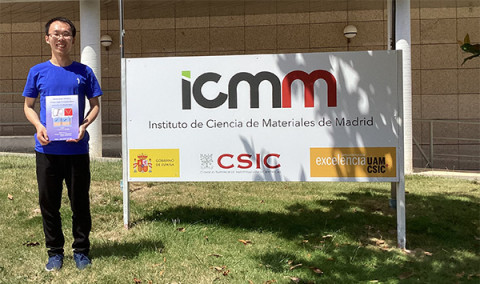Zengxin Wei, new doctor: "I am motivated by the prospect of applying research discoveries to improve our daily lives in the future"

Zengxin Wei just became a new doctor this month. He has been working alongside Manuel Vázquez and David Navas and defended his thesis, entitled ad 'Influence of Layer Thickness on Exchange Coupled Ferromagnetic Bilayers separated by a Non-Magnetic Spacer'.
"I chose ICMM for several compelling reasons", he says, and details: "Advanced Research and Innovation, Esteemed Reputation, Exceptional Supervision, Comprehensive Scientific Training, Collaboration and Networking Opportunities and so on". Asked about explaining his research to a non-scientific audience, he explains: "In our society, magnetic storage and communication technologies are essential. However, as the demand for these technologies increases, energy consumption becomes a growing concern". Tha's why, To address this, his research focuses on designing and creating "faster, more energy-efficient devices". "I work with common magnetic and non-magnetic materials to innovate device structures that can meet the rising demands while reducing energy use", he says.
What are the main applications of your research? Could you give us an example?
My research primarily focuses on applications in magnetic storage and high-frequency devices. Examples include hard disk drives (HDDs) and radar systems.
What are the lessons you learned here? which one do you value the most?
During my studies, I've learned two valuable lessons: "Frontiers in Materials Science I: Design and Preparation" and "Frontiers in Materials Science II: On-demand Properties for New Technologies."
The first lesson has been particularly beneficial for my future research. It provided me with a comprehensive understanding of various techniques along with their advantages and disadvantages
How do you think this experience will contribute to your training and to your future?
This experience has significantly enhanced both my understanding of the entire scientific research process and my problem-solving abilities.
What are your plans once you finish your PhD?
Upon completing my PhD, I plan to return to China to pursue a postdoctoral research position. I aim to foster greater communication and collaboration between ICMM and the laboratory where I will conduct my postdoctoral research.
Why did you become a scientist? Who have been your role models?
Currently, I consider myself a scientific researcher, though the title of "scientist" may not fully apply yet. I aspire to make significant contributions in the future.
There are several reasons why I chose this path. Firstly, I have always been fascinated by the wonders of science. Since childhood, my curiosity led me to experiment and explore scientific concepts, much like playing with toys at home. Secondly, I find great satisfaction in writing scientific papers and sharing research findings with fellow researchers. The ability to contribute to the collective knowledge of humanity is deeply fulfilling. Lastly, I am motivated by the prospect of applying research discoveries to improve our daily lives in the future.
As for role models, I draw inspiration from various scientists whose experiences and insights I admire. Learning from their achievements and dedication continues to shape my journey. Throughout history, countless scientists have made invaluable contributions, many of whom are not widely recognized, including Nobel Prize winners. I believe the enduring impact of their contributions to science and society should be celebrated and remembered.
Instituto de Ciencia de Materiales de Madrid (ICMM)
Sor Juana Ines de la Cruz, 3
Cantoblanco, 28049
Madrid, España
Telephone: (+34) 91 334 90 00
Email: @email
Communication Office: @email

Acknowledge the Severo Ochoa Centres of Excellence program through Grant CEX2024-001445-S/ financiado por MICIU/AEI / 10.13039/501100011033

Contacto | Accesibilidad | Aviso legal | Política de Cookies | Protección de datos
